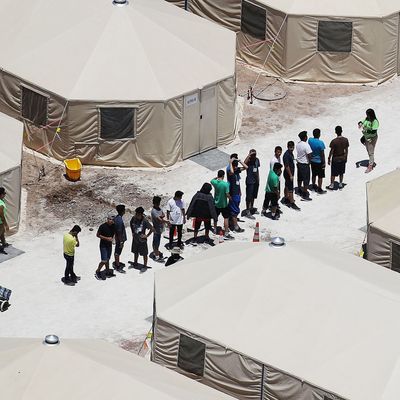
The U.S. government does not have the resources to deport every undocumented immigrant in the United States. America only has so many deportation judges, detention beds, and ICE agents. Thus, federal authorities must set priorities for immigration enforcement. In the final years of the Obama administration, ICE prioritized the removal of undocumented people suspected of involvement in serious crimes; under the Trump administration, the agency is, ostensibly, prioritizing the deportation of immigrants who volunteer to look after migrant children stranded in the U.S. without a guardian. As CNN reports:
Federal officers have arrested dozens of undocumented immigrants who came forward to take care of undocumented immigrant children in government custody, and the Trump administration is pledging to go after more.
On Tuesday, Immigration and Customs Enforcement senior official Matthew Albence testified to Congress that, after Health and Human Services and ICE signed a memorandum of agreement to background-check and fingerprint potential “sponsors” of immigrant children, ICE arrested 41 people who came forward.
In response to an inquiry from CNN, an ICE official confirmed that 70% of those arrests were for straightforward immigration violations – meaning they were arrested because ICE discovered they were here illegally.
When unaccompanied minors cross the U.S. border without documentation — and claim to be seeking asylum from adverse conditions in their home countries — they are entitled to press their asylum claims in court, a process that can take months, if not years, to complete. While migrant children await their day in court, the Department of Health’s Office of Refugee Resettlement (ORR) is responsible for either caring for them in federal detention, or else placing them with a sponsor family in the U.S.
ORR has traditionally regarded the latter as preferable. In most instances, children will fare better with a sponsor family than they will in lockup, and placing them with the former is also less of a burden on federal coffers. To facilitate the placement of migrant children — many of whom have undocumented immigrant relatives in the U.S. — ORR does not consider immigration status when evaluating whether an individual is fit to look after a migrant child, and has typically worked to make undocumented sponsors feel secure in coming forward.
But earlier this year, in response to previous instances in which the government put children in dangerous circumstances — or lost track of them, completely — HHS and ICE adopted a policy of running background checks on all sponsors. And instead of using such checks exclusively to ensure the safety of migrant children, the Trump administration opted to use them as a means of identifying undocumented immigrants for ICE to hunt down.
One would expect this policy to increase the number of migrant children stranded in federal detention (by scaring off a large category of would-be sponsors). And that expectation appears to be correct: The number of child migrants in HHS custody has skyrocketed in recent months, with a record 13,000 in detention as of Thursday.
By all appearances, the White House views this as a feature, not a bug, of its “prioritize the removal of undocumented immigrants who wish to relieve the state of some of its child-care burdens” policy. The administration has previously lamented the fact that migrant children are allowed to live comfortably with their undocumented relatives in the U.S., while waiting to press their asylum claims, describing the practice as a subversion of the law. As they made clear with their family-separation policy, Trump and his advisers believe that the U.S. government has a duty to make seeking asylum in the United States as unappealing as possible, so as to deter cross-border migration. And one way to do that is to keep as many child migrants as possible locked up in makeshift tent prisons, by prioritizing the deportation of would-be caregivers over that of hardened criminals.






























